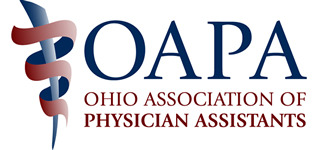Complete Story
11/10/2025
Serving Those Who Served: PA Uses Military Experience to Support Fellow Veterans
In celebration of Veterans Day, OAPA honors the PA profession’s strong military roots and expresses gratitude to all PAs who are serving or have served in the armed forces. This feature article highlights one of Ohio’s many PAs who proudly carry that legacy forward.
 Kevin Mora, PA-C
Kevin Mora, PA-C
Physician Assistant and Navy Veteran, pictured with his wife, Kathryn Mora, PA-C, and their family
What inspired you to transition from military service to becoming a PA?
I enlisted into the Navy after graduating from high school, only a few weeks after the attacks of 9/11. While I had learned a lot while serving on active duty for 8 years, I still felt like I was missing a more formal college education. I decided to leave the service and pursue my education full time. I always knew I wanted to work in healthcare and my initial intention was set on medical school to become a physician. I ultimately chose the PA route because of the more favorable work-life balance, career flexibility between specialties, and the lower overall cost of education. I was also an older, non-traditional student, and so the shorter training period in becoming a PA was very appealing to me at the time.
How has your military experience influenced the way you practice medicine as a PA?
Life in the military can be very demanding, particularly while on deployments. Rigorous training, long days of work, night shifts for watches, and stressful (sometimes traumatic) situations are not uncommon. These same experiences can also be found in certain hospital settings, like in the ED, critical care, and some surgical services. I feel like my experience in the military has allowed me to stay calm and level headed in any stressful situations I’ve encountered as a PA. I also gained a deep sense of teamwork and brotherhood while in the military, and this has served me well while working with other members of multidisciplinary healthcare teams.
What values or lessons from your service do you carry into your work with patients today?
Every military branch has their core values, and in the Navy, they are Honor, Courage, and Commitment. As a young Sailor, I always thought it was kind of corny to recite these all the time. As I've grown older, I have come to find great value in having a set of guiding principles.
Every time I see a patient, I try my best to honor their time. Sometimes it can be easy to forget that our patients may have had to wait weeks for their appointment, only to get 10-15 minutes to put themselves out there and ask someone else for help. On top of this, we all have our bad days, our own biases, and sometimes difficult interactions with other patients (and maybe even staff). Making sure not to carry any of that with me into an appointment, and to honor the patients' time, is a constant practice.
Not every decision in healthcare is easy and clear-cut. Sometimes patients may request treatments that are not in the best interest of their long-term health. There are often difficult conversations to be had with patients. Having the courage to make the right decisions, and to lead any of these difficult conversations, is an important part of my daily practice.
Lastly, practicing medicine requires a fair amount of humility. We spend years with our noses in the books, reading, memorizing, learning, practicing skills. We become attached to these learned ideas. Early on in the field, the stark realization of how little we actually know may start to sink in. Then, we begin to practice these skills day-in and day-out, and hopefully we start to feel a little comfortable in our specialty one day. The deeper our knowledge becomes, it again becomes apparent how much we still have to learn about the human body/experience.
If there’s one thing a new provider should understand, and apply to the underlying structure of their practice, is that the standard in which we currently practice medicine is antiquated. It’s just a matter of time for that fact to be revealed. It requires a lifetime commitment of constantly learning new things in order to better help our patients. It also requires that we sometimes allow learned things to be retired when they are no longer helpful.
What does Veterans Day mean to you personally, now that you serve your community in healthcare?
I think it is great to have a day that honors the service of those who have committed to serving our country. Veterans are a very unique patient population and can vary greatly in their demographic. Whether they served in WWII, the Korean war, Vietnam, the Gulf war or the post-9/11 era, they each have their own unique set of challenges. One thing that I found to be somewhat consistent is that these vets tend to take a “tough it out” approach to things, oftentimes putting their own health on the backburner. They also tend to be grossly underserved. I am now fortunate enough to work at the VA currently, and I have the honor of serving these people every day.
What advice would you give to other veterans who are considering a career as a PA?
Shadow various people in healthcare (physicians, techs, admin, etc) to ensure PA is indeed the route you would like to commit pursuing. If you land on the PA route, commit to learning and set a clear path for your education in order to take full advantage of any benefits your military service may have offered (ex. GI bill). Find a mentor to help navigate any professional and personal challenges along the way.
Our thanks to Kevin Mora, PA-C, for his service and for sharing his story with us in celebration of Veterans Day.

